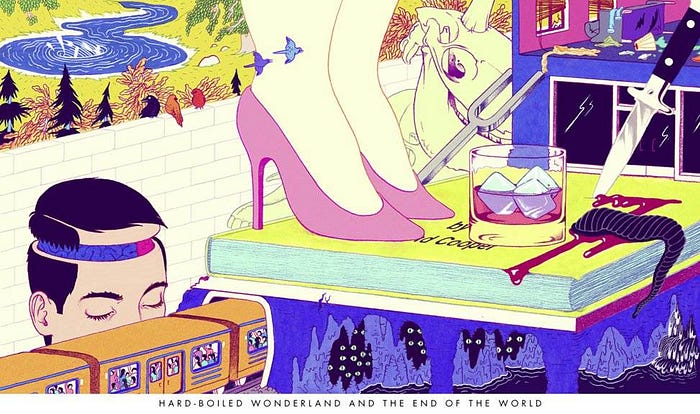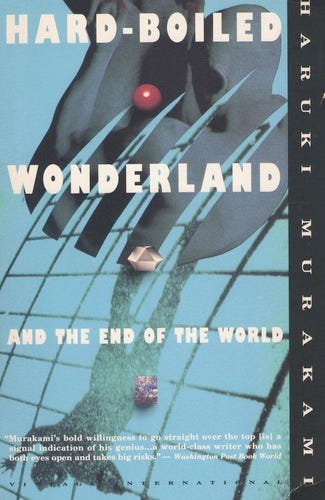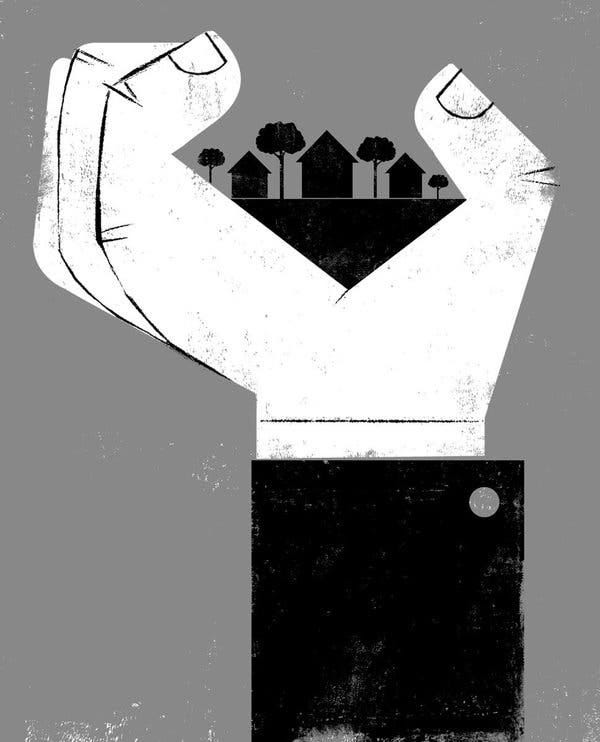Living is Feeling: Haruki Murakami’s Hard-Boiled Wonderland and The End of the World

In Haruki Murakami Hard-Boiled Wonderland and the End of the World (世界の終りとハードボイルド・ワンダーランド, Sekai no owari to hādo-boirudo wandārando), the reader is presented with two realities.
In Hard-Boiled Wonderland, we are introduced to the Calcutec. He was engineered to be a data encryption unit. In The End of the World, we are introduced to a reflective, dream-like figure, who fights desperately to save his “shadow”, a physical representation of what was removed when he entered The Town. He becomes a Dreamreader, a job that involves “reading” skulls to free any traces of shadow selves.
To avoid disturbing the residents, any trace of people’s minds, as embodied in their shadow, must be altogether removed from the grounds. The vast majority are extinguished when the skulls are burned, but some remain. For those, the dreams must be read aloud from their skulls, and such is the duty of the Dreamreader.

This ominous act is not one-dimensional: It conveys a desire for harmony at the expense of individuality. As the Dreamreader becomes aware that he, too, is slowly being purged of his mind, as represented by the killing of his Shadow, he becomes resistant.
“You tell me there is no fighting or hatred or desire in the Town. That is a beautiful dream, and I do want your happiness. But the absence of fighting or hatred or desire also means the opposites do not exist either.”

“No joy, no communion, no love. Only where there is disillusionment and depression and sorrow does happiness arise; without despair or loss, there is no hope.”
The Calcutec is described unconsciously counting coins. When his expectations fail to align with reality, he becomes intellectually disturbed, and pulled into an existential crisis. His brain encodes sensitive data, but a spalpeen scientist also saved the Calcutec’s subconscious into his brain. This subconscious comes to life in The End of the World as the Dreamreader, triggering existential questions about what it means to truly live.

As the Calcutec narrates his identity, he is something of a cactus in the sun. Outside, he appears dry, unimaginative, and boring. Yet, as we come to find in the End of the World, the Calcutec is subconsciously fighting to save his memories, or his “shadow self”, one who enjoyed music and poetry, from being lost to the System, which prioritizes him only for his data encryption abilities.
“Music brings a warm glow to my vision, thawing mind and muscle from their endless wintering.”
Murakami’s Calcutec can be seen today when organizations use language as a means of control. The Calcutec represents the violence involved when the essential self is purged for the benefit of the organization.
Purging the essential ambiguity of human experience through organizational language only proves a deep awareness of the incompatibility of ethical ontology with maximal productivity.
As it interposes itself between living bodies, the body is forgotten, the emotion silenced ‘leaving something important unsaid, some necessary unspoken remainder’ which creates ‘monstrous openings’ outside language.” Westwood, 2001.
Many jobs are not only tiring because of the labor involved, they are tiring because of the dehumanization that occurs through alienating and reductive bureaucratic language. Workers experience this most often when encountering Human Resources. Human Resources professionals are incentivized to maintain their ‘self is organization’ mentality, lest they pay the price of losing their job.

Organizations would like you to believe that individual identities are not only permitted, but celebrated, by publicizing policies such as allowing employees to color their hair in shades of blue, or gasp, orange.
May it be a surprise to no one that this is not true freedom.

The desire of an organization is for the death of your desire.
In donning their “H.R.” monikers, these individuals come to represent more than mere people. In fact, their presence may convey the ominous threat that “the organization is watching.”

Murakami’s writing promotes a cognizance that the true self cannot align with organizational principles without experiencing a loss of self.
The United States tragically associates economic and personal value as inextricable sums, and perpetuates systems of bias that impact which individuals can obtain economic value at all.
There is the implicit notion that whatever “normal” or “typical” is also “good.” This good is good for the bottom line, not morally good, or good for individuals. This trio are commonly confounded, leading to internal wars of the psyche and confusion about identity and personal worth in the context of modern work.
“Narrative remainders, despite their normative silence, their speechless, make claims on our bodies. Life escapes representation and construction in language and yet the organizing ‘oughts’ of living in and with nature are limitless. Questing and incomplete humans, in organizing their lives, move and these movements cross over and mingle with the incomplete quests of other organisms.” -Westwood, 2001.
